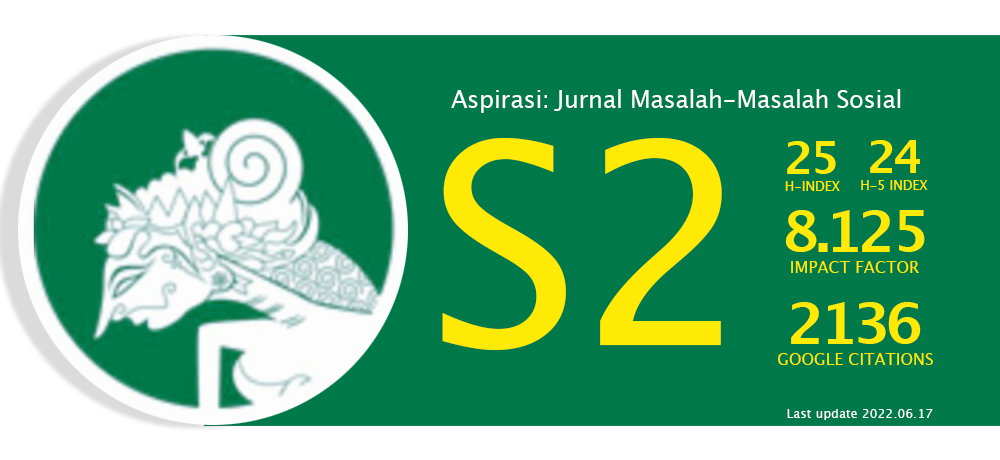Ocean Grabbing di Indonesia dan Malaysia: Catatan Krisis Sosio-Ekologis Dampak Proyek Reklamasi
Abstract
This study explores the ocean grabbing phenomenon that arises as a result of the reclamation project undertaken to facilitate the expansion of urban capital. The case of reclamation projects in Indonesia and Malaysia is taken to be compared with the consideration of the method of spending and facilitation on urban capital investment through the reclamation project. The need for new land which has become the culprit of the reclamation project will be explored about the impact it has had on the socio-ecological crisis that coastal communities must suffer. This study is a literature review carried out by tracing research reports, journal articles, and online media coverage related to the problem being examined. This study was carried out by borrowing the definition of ocean grabbing made by Bennett, Govan, and Satterfield and the criteria they made to show socio-ecological crises arising in coastal communities due to the reclamation project. The results of the study show that reclamation projects in Indonesia and Malaysia pose serious ocean grabbing problems. First, reclamation projects in Indonesia and Malaysia have poor governance. Minimal public participation and inadequate planning are a way for the facilitation of urban capital expansion in the reclamation project. Second, the reclamation project has worsened the living conditions of coastal communities due to loss of catchment area, decreased income, and deprived the community of its living space. Third, the reclamation project has caused damage to the ecosystem which has broken the balance of the environment in marine waters.
Abstrak
Kajian ini mendalami fenomena ocean grabbing yang muncul akibat proyek reklamasi yang dilakukan untuk memfasilitasi ekspansi modal. Kasus proyek reklamasi di Indonesia dan Malaysia diambil untuk diperbandingkan dengan melihat metode pengurugan dan upaya memfasilitasi investasi perkotaan dalam proyek reklamasi. Kebutuhan lahan baru yang menjadi biang keladi dari proyek reklamasi akan didalami mengenai dampak yang ditimbulkannya pada krisis sosio-ekologis yang harus diderita masyarakat pesisir. Studi ini adalah kajian pustaka yang dilakukan dengan menelusuri laporan penelitian, artikel jurnal, dan pemberitaan media daring yang terkait dengan persoalan yang dikaji. Kajian ini dilakukan dengan meminjam pendefinisian ocean grabbing yang dibuat oleh Bennett, Govan, dan Satterfield serta kriteria yang mereka buat untuk mengidentifikasi krisis sosio-ekologis yang muncul di masyarakat pesisir akibat proyek reklamasi. Hasil kajian menunjukkan bahwa proyek reklamasi di Indonesia dan Malaysia menimbulkan masalah ocean grabbing secara serius. Pertama, proyek reklamasi di Indonesia dan Malaysia memiliki tata kelola yang buruk. Partisipasi publik yang minim dan perencanaan tidak memadai menjadi jalan bagi fasilitasi ekspansi modal dalam proyek reklamasi. Kedua, proyek reklamasi telah memperburuk keadaan kehidupan masyarakat pesisir akibat hilangnya daerah tangkapan, penurunan pendapatan dan mencerabut komunitas dari ruang hidupnya. Ketiga, proyek reklamasi menyebabkan kerusakan ekosistem yang telah merusak keseimbangan lingkungan di perairan laut.
Keywords
Full Text:
pdfReferences
Abdullah’, D. I. H. S. bin, & Loi, H. K. (1992). Coastal Reclamation In Malaysia. In Regional Seminar on Land Reclamation for Urban Development. University Malaya, Kuala Lumpur, August 10– 11, 1992, 1–11.
Amanda, A., Ngenget, I., & Makhdor, M. (2019). Kebijakan Gubernur Basuki Tjahaja Purnama dalam Reklamasi Pantai Utara Tahun 2014– 2017. Jurnal ISIP: Jurnal Ilmu Sosial dan Ilmu Politik, 16(2), 105–118.
Ambari, M. (2019, September 18). Reklamasi Pesisir Jadi Pilihan Rakyat atau Pemerintah? Retrieved from https://www.mongabay.co.id/2019/09/18/ reklamasi-pesisir-jadi-pilihan-rakyat-atau- pemerintah/, on February 25, 2020.
Arsyad, A. (2008). Coastal reclamation projects in Indonesia: the weaknesses which lead to severe socio-environmental impacts. In International Conference on Environmental Research and Technology. Universiti Sains Malaysia, Penang, May 28–30, 2008, 426–429.
Aspan, Z. (2017). Tinjauan Yuridis Izin Reklamasi Pantai Makassar Dalam Mega Proyek Centre Point Of Indonesia. Bina Hukum Lingkungan, 1(2), 172–189. doi: 10.24970/jbhl.v1n2.14.
Barbesgaard, M. (2016). Blue growth: saviour or ocean grabbing? In Global governance/politics, climate justice & agrarian/social justice: linkages and challenges An international colloquium. International Institute of Social Studies, The Hague, February 4–5, 2016, 1–16.
Barbesgaard, M. (2019). Ocean and land control- grabbing: The political economy of landscape transformation in Northern Tanintharyi, Myanmar. Journal of Rural Studies, 69(July 2018), 195–203. doi: 10.1016/j.jrurstud.2019.01.014.
Bennett, N. J., Govan, H., & Satterfield, T. (2015). Ocean grabbing. Marine Policy, 57(1), 61–68.
Chan, N. W. (1998). Environmental hazards associated with hill land development in Penang Island, Malaysia: some recommendations on effective management. Disaster Prevention and Management, 7(4), 305–318.
Colven, E. (2017). Understanding the Allure of Big Infrastructure: Jakarta’s Great Garuda Sea Wall Project. Water Alternatives, 10(2), 250–264.
Djainal, H. (2012). Reklamasi Pantai Dan Pengaruhnya Terhadap Lingkungan Fisik Di Wilayah Kepesisiran Kota Ternate. Jurnal Lingkungan Sultan Agung, 1(1), 1–13.
Doaly, T. (2019, January 20). Begini Dampak Merusak Reklamasi Pantai Malalayang Dua Manado. Retrieved from https://www.mongabay. co.id/2019/01/20/begini-dampak-merusak- reklamasi-pantai-malalayang-dua-manado/, on March 15, 2020.
Doerr, F. (2016). Blue Growth and Ocean Grabbing: A Historical Materialist Perspective on Fisheries in East Africa. In Global governance/politics, climate justice & agrarian/social justice: linkages and challenges. An international colloquium. International Institute of Social Studies, The Hague, February 4–5, 2016, 1–20.
Foley, P. & Mather, C. (2018). Ocean grabbing, terraqueous territoriality and social development. Territory, Politics, Governance, (1), 1–18.
Ghazali, N. H. M. (2006). Aquatic Ecosystem Health & Management Coastal erosion and reclamation in Coastal erosion and reclamation. Malaysia. Aquatic Ecosystem Health & Management, 9(2), 37–41. doi: 10.1080/14634980600721474.
Grydehøj, A. (2015). Making Ground, Losing Space: Land Reclamation and Urban Public Space in Island Cities. Urban Island Studies, 1(December), 96–117. doi: 10.20958/uis.2015.6.
Hasani, M. F. (2015). Kajian Dampak Sosial Ekonomi Pengembangan Reklamasi Pantai Untuk Kawasan Ruang Publik (Studi Kasus: Pantai Losari, Makassar). Laporan Penelitian. Pusat Penelitian dan Pengembangan Sosial, Ekonomi, dan Lingkungan Badan Penelitian dan Pengembangan Pekerjaan Umum Kementerian Pekerjaan Umum.
Himawan, A. & Tolen, N. (2016). Total Ada 37 Proyek Reklamasi di Indonesia. Suara. com. Retrieved from https://www.suara.com/ bisnis/2016/10/04/183704/total-ada-37-proyek- reklamasi-di-indonesia, on February 25, 2020.
Hossain, M. S., Hashim, M., Bujang, J. S., Zakaria, M. H., & Muslim, A. M. (2018). Assessment of the impact of coastal reclamation activities on seagrass meadows in Sungai Pulai estuary, Malaysia, using Landsat data (1994–2017). International Journal of Remote Sensing, 1–34.
Husin, S. (2017). Reclamation In The View Of The Protection Of Marine Environment Under The Environmental Law And The Law Concerning The Management Of Based On The Pro And Con Statements Mentioned Above, It Is Obvious That The Role Of Laws And Regulation Is Inevitables. Indonesian Journal of International Law, 14(3), 309–320. doi: 10.17304/ijil.vol14.3.698.
Ishak, N. S., Yusup, M., Arshad, A. F., & Abdullah, Y. A. (2016). A Review on the Significance of Local Plan for Coastal Reclamation Development: The Case of Malacca, Malaysia. In MATEC Web of Conferences 66. Kuala Lumpur, March 7–8, 2016, 1–8.
Jou, S., Hansen, A. L., & Wu, H. (2012). Accumulation by Dispossession and Neoliberal Urban Planning: ‘Landing ’ the Mega-Projects in Taipei. In T. Tasan-Kok & G. Baeten (Eds.), Contradictions of Neoliberal Planning Cities, Policies, and Politics, 151–171. New York: Springer-Verlag Berlin Heidelberg. doi: 10.1007/978-90-481- 8924-3.
Jumain, N. A., Kamarulzaman, N. H., Latif, I. A., & Yusoff, F. M. (2018). Impact of Reclamation on Fishery Activities in Malaysia. International Journal of Agriculture, Environment and Bioresearch, 3(3), 87–97.
Kalalo, F. P. (2009). Kebijakan Reklamasi Pantai dan Laut: Implikasi terhadap Hak Masyarakat Pesisir dan Upaya Perlindungannya. Jurnal Hukum dan Pembangunan, 39(1), 102–118.
Kanniah, K. D., Sheikhi, A., Cracknell, A. P., Goh, H. C., Tan, K. P., Ho, C. S., & Rasli, F. N. (2015). Satellite Images for Monitoring Mangrove Cover Changes in a Fast Growing Economic Region in Southern Peninsular Malaysia. Remote Sens, 7, 14360–14385.
Knott, C. & Neis, B. (2016). Privatization, financialization, and ocean grabbing in New Brunswick herring fisheries and salmon aquaculture. Marine Policy, 80(1), 1–9.
Koto, J. (2017). Preliminary Study on Impacts of Reclamation of 17 Islands in Jakarta Bay Preliminary Study on Impacts of Reclamation of 17 Islands in Jakarta Bay. International Journal of Environmental Research & Clean Energy, 8(1), 9–17.
Kumar, A. (2011). Land in the Neoliberal Times: A Commodity or a Social Good? India Journal, 8(2), 8–23.
Liyubayina, V. (2018). Analisis Dampak Reklamasi Teluk Banten (Studi Kasus: Kecamatan Bojonegara). Jurnal Planesa, 9(1), 37–46.
Mahdi, I. (2017). Reklamasi Teluk Jakarta; Sebuah Perspektif Kekuasaan dalam Ekonomi Politik. Jurnal Transformasi Global, 4(1), 38–45.
Maulidiyah, I. (2016). Perizinan Reklamasi Pantai Dalam Kaitannya dengan Perlindungan dan Pengelolaan Lingkungan Hidup di Kota Bandar Lampung. Tesis. Program Studi Magister Ilmu Hukum Fakultas Hukum Universitas Lampung.
Mayberry, K. (2016, December 2). Land reclamation in Malaysia puts environment, endangered turtle at risk. Retrieved from https://news.mongabay. com/2016/12/land-reclamation-in-malaysia- puts-environment-endangered-turtle-at-risk/, on February 25, 2020.
Meadows, M. E., Sengupta, D., & Chen, R. (2018). Building beyond land : An overview of coastal land reclamation in 16 global megacities. Applied Geography, 90(December), 229–238. doi: 10.1016/j.apgeog.2017.12.015.
Mohamed, J. & Razman, M. R. (2018). Management And Initiatives Towards Sustainable Coastal Development In Malaysia: Experience From Reclamation Activities In Malacca. Asian Journal of Environment, History and Heritage, 2(1), 23–32.
Moser, S. (2018). Forest City, Malaysia, and Chinese Expansionism. Urban Geography, 39(6), 935– 943.
Murali, R. S. N. & Mahorm, S. (2018, September 18). Melaka looking for loopholes to stop reclamation project. Thestar.com. Retrieved from https:// www.thestar.com.my/news/nation/2018/09/18/ melaka-looking-for-loopholes-to-stop- reclamation-project/, on March 16, 2020.
Nadzir, N. M., Ibrahim, M., & Mansor, M. (2014). Impacts of Coastal Reclamation to the Quality of Life : Tanjung Tokong community, Penang. Procedia - Social and Behavioral Sciences, 153, 159–168. doi: 10.1016/j.sbspro.2014.10.050.
Pawitro, U. (2015). Reklamasi Kawasan Pesisir Pantai: antara Pelestarian Lingkungan dan Ekonomi Kawasan. In Prosiding Temu Ilmiah IPLBI 2015. Universitas Sam Ratulangi, Manado, October 30–31, 2015, 147–154.
Piri, I. E. (2020, January 11). Terpinggir karena Reklamasi, Nasib Nelayan Teluk Manado Kini [2]. Retrieved from https://www.mongabay. co.id/2020/01/11/terpinggir-karena-reklamasi- nasib-nelayan-teluk-manado-kini-2/, on March 15, 2020.
Priyandes, A. & Majid, M. R. (2009). Impact of Reclamation Activities on the Environment Case Study: Reclamation in Northern Coast of Batam. Jurnal Alam Bina, 15(1), 1–14.
Puspasari, R., Hartati, S. T., & Anggawangsa, R. F. (2017). Analisis Dampak Reklamasi terhadap Lingkungan dan Perikanan di Teluk Jakarta. Jurnal Kebijakan Perikanan Indonesia, 9(2), 85–94.
Rosli, M. I., Ahmad, M. A., Kaamin, M., & Izhar, M. F. N. (2016). Shoreline Delineation and Land Reclamation Change Detection Using Landsat Image. In IOP Conference Series: Materials Science and Engineering. Langkawi, October 27–29, 2015, 1–9.
Rudianto & Isdianto, A. (2020). Management of Sustainable Coastal Reclamation Areas: A Case Study of the Reclamation of Tering Bay in Batam Island, Indonesia. Journal of Aquaculture and Fish Health, 9(February), 57–68.
Ruslin, I. T. (2017). Subaltern dan Kebijakan Pembangunan Reklamasi Pantai di Kota Makassar. Jurnal Politik Profetik, 5(2), 186–199.
Sahabat Alam Malaysia. (2019, February 26). Impacts Of Coastal Reclamation In Malaysia. Retrieved from https://www.foe-malaysia.org/impacts_of_ coastal_reclamation_in_malaysia, on February 25, 2020.
Sandirasegaran, K. & Manap, N. (2016). Impacts Of Dredging And Reclamation Projects. Jurnal Teknologi, 787(7–3), 139–143.
Transnational Institute. (2014). The Global Ocean Grab A Primer. (C. Pedersen, T. Feodoroff, R. Reuter, J. Franco, N. Buxton, M. C. Barbesgaard, & P. Vervest, Eds.). Amsterdam: Transnational Institute (TNI) Agrarian Justice Programme, Masifundise Development Trust and Afrika Kontakt together with World Forum of Fisher Peoples (WFFP).
Wibawa, A. P. (2017). Symbolic Battle in Benoa Bay Reclamation Bali Indonesia. International Journal of Science and Research (IJSR), 6(3), 744–749. doi: 10.21275/ART20171584.
Wiranata, I. M. A., Mardliyah, S., & Achmad, Z. A. (2016). The Contestation of Discourses on Sustainable Development in The Controversy of Benoa Bay Reclamation. In ICoCSPA 2016 International Conference on Contemporary Social and Political Affair 2016. Universitas Airlangga, Surabaya, July 28–30, 2016, 292– 300.
Yulianti, R., Ikhwan, M., & Zaman, N. (2015). Urgensi Pengaturan Reklamasi Pantai di Wilayah Pesisir Selatan Madura. Yustisia, 4(1), 103–121.
Yusup, M., Arshad, A. F., Abdullah, Y.120 A., & Ishak, N. S. (2015). Coastal Land Reclamation: Implication towards development control system in West Malaysia. In The Asia-Pacific International Conference on Environment- Behaviour Studies. Barcelona School of Architecture, Barcelona, 31 Aug.–05 Sep., 2015, 354–361.
DOI: https://doi.org/10.46807/aspirasi.v11i1.1587
Refbacks
- There are currently no refbacks.







